My first and primary objective is to raise the intellect of my students from a lower to higher existence. To raise the intellect is to increase its breadth of knowledge, to improve its maneuverability, and to more closely align its own conceptions to reality itself. To learn another language is to achieve exactly these things. By learning a language, students are exposed to a wider view of reality, which increases the breadth of their knowledge by mere interaction with the subject. When the intellect is first confined by the limitations of a new setting of a different language, it is later more free to maneuver what it knows because it has a wider range of language skills to understand and communicate what it knows, quite tangibly increasing its maneuverability. Because every language maintains an individuality about itself, when students use it to perceive reality they inevitably gain an increased perspective of the world. This means that their previous conceptions about the world are corrected, or at least adjusted better, towards reality itself.
Since this is the learning goal I maintain for my students, my instruction has to follow suit. In language classrooms it is possible for students to learn about a language and not learn the language itself. If they only learn about the language they cannot gain the new perspective of reality or improve their intellect’s maneuverability. It is instead necessary that I assist my students to gain a skill based mastery of the language. This can only be achieved in one way: by introducing comprehensible input that fosters understanding of the language and creates a repository of language knowledge within the individual. Over time the repository gathers strength and force and is able to be summoned by the students to produce their own formulations of the language that I do my best to elicit, even from day one. I am, in essence, a living book for my students. I exist in the classroom to give them as much comprehensible language input as possible, either directly from me or from a text source I provide to them.
What I hold and maintain around this notion of education and instruction is that student engagement is absolutely necessary. Since education constitutes two parts, the form of my instruction and the matter of my students’ intellects, there are two elements to discuss about engagement. First is that I must foster the engagement as much as possible. When appropriate, I restrict student flexibility so that they are not engaged in their choices but are solely engaged with me or the task that I have given them. Language learning is difficult, and they need to focus as much effort as possible on understanding the language at hand. I also try to offer interesting content for their comprehension. I use dynamic characters, compelling plots, and logical puzzling to gather their attention. Furthermore, I foster a cyclical structure of class from week to week so students can focus most of their attention on the content of class rather than the structure of it. Second, however, is that students must be engaged with me. Explicit coaching in the native language on my part involves teaching students about the necessity of their election to participate and receive what I am giving. A master can lead his horse to the water, but the horse must choose to drink.
Because my philosophy of language instruction revolves around building a repository of that language within the student, a method which inherently involves little output on the part of the students, I tend to assess and grade as little as possible around the actual language growth itself. When I do assess and grade students, it revolves around their ability to comprehend material rather than just the content of their previous comprehension. In the short term this may seem to produce less than capable students, but in the long run leads to ultimate success. In the end of a given course period, I have lead students to have a higher intellect and to have a higher skill in the target language.

